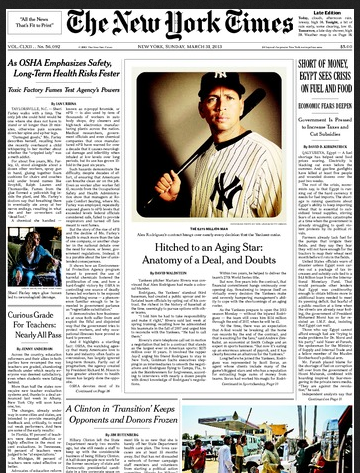This week's column by Ctein
Three years ago, I wrote an introductory column on the subject of trademarks. It's time to hit that subject again, especially in light of a recent kerfuffle between DigitalRev and Woodman Labs.
I strongly recommend readers review my previous column and the comments therein for a more complete take on the nature of trademark than I'm presenting here.
It's important to understand the trademarks and copyrights are very different entities. A trademark doesn't have to be creative or novel or any kind of intellectual invention. It's just something that uniquely identifies your business and allows you to distinguish it from competitors. That's why there are registered trademarks for Apple (Computers) and Music, Windows operating systems, and McDonald's hamburgers. (You don't have to register a trademark, although that affords additional protections.) You can even register your own name as a trademark, within the scope of your business. Some famous artists and photographers have done so.
(No, I have not registered Ctein. Although the name is close to unique, it's just not all that valuable.)
The same word can be used as a trademark by a bunch of different businesses or products, so long as they are not competing in the same arena. Example—Apple (Computers) and Apple Music. Even trademarked logos can be similar, so long as there's no chance of confusion.
There are the inevitable gray areas in anything involving intellectual property. There's no obstacle to me opening up a portrait studio called McDonald's Portraits. If I name it McDonald's Kids Portraits and adopt a clown as my corporate mascot, I'm pushing my luck. I definitely better not paint the studio red and yellow and put a golden arch over the door!
It's not that the Burger Meister (I was going to say King, but, well, you know...) is in the portrait business. But I'm starting to create the misimpression that my business is part of their empire, and that's a no-no. If your actions sow confusion about who's in what business, you're into infringement territory.
A trademark is very specific. You can't trademark a concept, even a physical one. The Rock 'n Roll Hall Of Fame lost their lawsuit against the photographer in good part because they tried to claim that any photograph of their building violated the trademarked images they used. That's a no-go. The Transamerica Corp. has trademarks on certain portrayals of their signature building. My photograph...
 Transamerica Pyramid, San Francisco, CA—1976. Photo by Ctein.
Transamerica Pyramid, San Francisco, CA—1976. Photo by Ctein.
...doesn't violate those. (Unless I start using it to advertise a real estate/financial business, and then we're back to sowing confusion. Don't go there.)
Similarly, the owners of Lone Cypress can't prevent you from making and using photographs of that tree anyway you want, so long as they're made from public property and so long as they're not close to specific renditions that they've trademarked (or you're using them in a business entirely separate from theirs and not likely to be confused with it).
A copyright lets me restrict and control reproduction of my words and photographs, except for some very narrow exceptions that are carved out by the Fair Use doctrine. A trademark, broadly speaking, does not. You can refer to trademarks in any way you like, so long as you're not sowing confusion or leveraging off of their business.
Remember the column I wrote some months back lambasting Apple for killing off Rosetta in Mac OSX 10.7 (a.k.a. Lion)? Do you think I needed Apple's permission before using any of those trademarked words? Technically speaking, they can require me to put the appropriate trademark symbol after each and every use (although that seems to be falling out of common practice), but they can't stop me from using them in my writings. If this weren't the case, it would be just about impossible to write any kind of article that referred to any products or companies without letters of permission from each and every one. Every single piece of writing you see, anywhere, that referred to a business or product would be a trademark violation.
They're not. The law simply does not allow for that kind of restriction on referring to a trademark. (But, again distinguishing between copyright and trademark, they can refuse me permission to use product photographs from their website, if they so choose.)
Now that said...
It's always worth remembering that a lot of people out there are bullies, thugs, or jerks. Some businesses out there will try to strong-arm you into doing things their way. They'll threaten you with lawsuits or worse. That's nothing new for writers or photographers. [Amen —Ed.] I've written in the past about how various manufacturers and individuals have gone ballistic over articles they didn't like, and it has nothing to do with the Internet, digital rights, or anything else. Trust me, those folks will always find something to threaten you with.
Understand that if you decide to give into them (and who would blame you), it's because you know they can beat the crap out of you. It's not because they have the law on their side.
©2013 by Ctein, all rights reserved
Links in this post may be to our affiliates; sales through affiliate links may benefit this site.
Our links page
(To see all the comments, click on the "Comments" link below.)
Featured Comments from:
Doug: "A nasty trap that many people innocently stumble into: properly used, a
trademark can be an adjective. Why does that matter? Consider these two
possible names for a web site that isn't run by Nikon:
nikonsupplies.com
suppliesfornikon.com
Most people wouldn't think there is any real difference between those
two names. But legally, there is a huge difference.
The first name is trademark infringement. It uses 'Nikon' as an
adjective for 'supplies,' and thereby implies that the site is run by
Nikon. The latter name does not suggest that Nikon runs the site."




